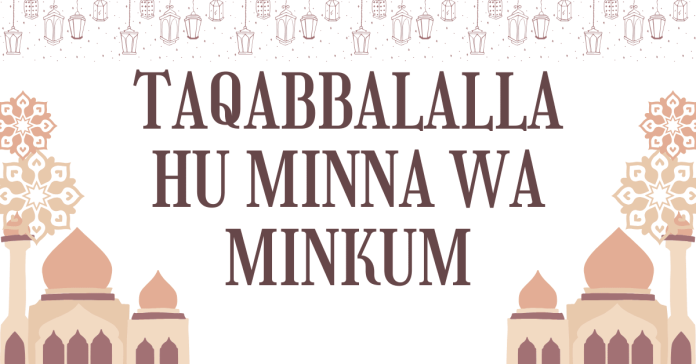Introduction to Taqabbalallahu Minna Wa Minkum
The phrase “Taqabbalallahu minna wa minkum” is a cherished expression among Muslims, particularly during the joyous occasions of Eid al-Fitr and Eid al-Adha. It carries profound spiritual significance, embodying the essence of gratitude, unity, and faith.
This supplication is not just a greeting; it’s a prayer. By saying these words, Muslims ask Allah to accept their acts of worship and good deeds, creating a bond of mutual hope and spiritual solidarity.
Taqabbalallahu Minna Wa Minkum in Arabic Text
The Arabic rendition of this beautiful supplication is:
تَقَبَّلَ اللهُ مِنَّا وَمِنْكُم
This simple yet powerful phrase encapsulates a heartfelt prayer, emphasizing the spirit of devotion and togetherness.
Meaning of Taqabbalallahu Minna Wa Minkum in English
In English, “Taqabbalallahu minna wa minkum” translates to:
“May Allah accept (this worship) from us and from you.”
Breaking it down:
- Taqabbal: To accept
- Minna: From us
- Wa Minkum: And from you
The supplication reflects a shared prayer for divine acceptance of one’s worship, fostering goodwill and reinforcing communal bonds.
Importance of the Supplication
Saying “Taqabbalallahu minna wa minkum” carries immense spiritual weight. It is more than a greeting—it’s an earnest prayer that celebrates the collective efforts of Muslims in worship and obedience to Allah.
Key Significance:
- Affirming Shared Worship: It acknowledges the mutual spiritual journey of the community.
- Seeking Allah’s Mercy: It reflects humility and hope in Allah’s acceptance of one’s deeds.
- Strengthening Brotherhood: This supplication enhances unity and goodwill within the Muslim community.
By exchanging this phrase, Muslims reaffirm their shared devotion and mutual prayers for Allah’s blessings and forgiveness.
Transliteration and Pronunciation Guide
For those unfamiliar with Arabic, here are some common transliterations:
- Taqabbalallahu minna wa minkum
- Taqabbal allahu minna wa minkum
- Taqaballahu minna wa minkum
These variations in transliteration help non-Arabic speakers pronounce the phrase correctly and participate in this meaningful tradition.
When to Use Taqabbalallahu Minna Wa Minkum
This supplication is most commonly exchanged:
- During Eid: After the Eid prayer, Muslims greet each other with “Taqabbalallahu minna wa minkum.”
- At Ramadan’s Conclusion: It’s a way to express hope that Allah accepts the fasting, prayers, and acts of worship performed during the holy month.
The phrase is also shared during family and community gatherings, adding warmth and spirituality to celebrations.
Response to Taqabbalallahu Minna Wa Minkum
When greeted with “Taqabbalallahu minna wa minkum,” the best response is to repeat the same phrase. Alternatively, you can say “Ameen,” affirming the prayer with “May it be so.”
Example Exchange:
- Person 1: “Eid Mubarak! Taqabbalallahu minna wa minkum.”
- Person 2: “Taqabbalallahu minna wa minkum, Ameen.”
This simple yet profound interaction enhances the spiritual connection among Muslims.
Historical Roots and Tradition
The tradition of saying “Taqabbalallahu minna wa minkum” dates back to the time of the Prophet Muhammad (ﷺ) and his companions. Jubayr ibn Nufayr reported:
“When the companions of the Messenger of Allah (ﷺ) met on the day of Eid, they would say to one another, ‘Taqabbalallahu minna wa minkum.’”
This practice, endorsed by many scholars, remains a cherished Sunnah that fosters love and brotherhood among Muslims.
Ruling on Saying Taqabbalallahu Minna Wa Minkum
While saying this supplication is not obligatory, it is a recommended Sunnah. Many scholars view it as a meritorious act that increases love and unity among Muslims.
Eid Etiquettes: Enhancing the Celebration
Beyond exchanging “Taqabbalallahu minna wa minkum,” observing these etiquettes adds depth to the Eid experience:
- Offering Congratulations: Saying “Eid Mubarak” or other greetings enhances the festive spirit.
- Performing Ghusl: Ritual purification before the Eid prayer reflects the importance of cleanliness and preparation.
- Eating Before Eid al-Fitr Prayer: Starting the day with something sweet, like dates, symbolizes the end of fasting.
- Wearing the Best Clothes: Dressing well signifies gratitude and celebration of Allah’s blessings.
- Reciting the Takbeer: Glorifying Allah from the night before Eid until the prayer strengthens faith and joy.
- Taking Different Routes to and from Prayer: Following the Prophet’s (ﷺ) Sunnah, this practice symbolizes spreading blessings.
Conclusion
“Taqabbalallahu minna wa minkum” is more than a greeting; it’s a prayer that unites Muslims in gratitude and hope. By incorporating this beautiful supplication into Eid celebrations, we strengthen our bonds of faith and community, ensuring that the spirit of Eid—peace, love, and mercy—continues to thrive.
As you celebrate this blessed occasion, remember to exchange this heartfelt phrase and embrace the deeper meanings it holds. May Allah accept our worship and bless our efforts. Ameen.

